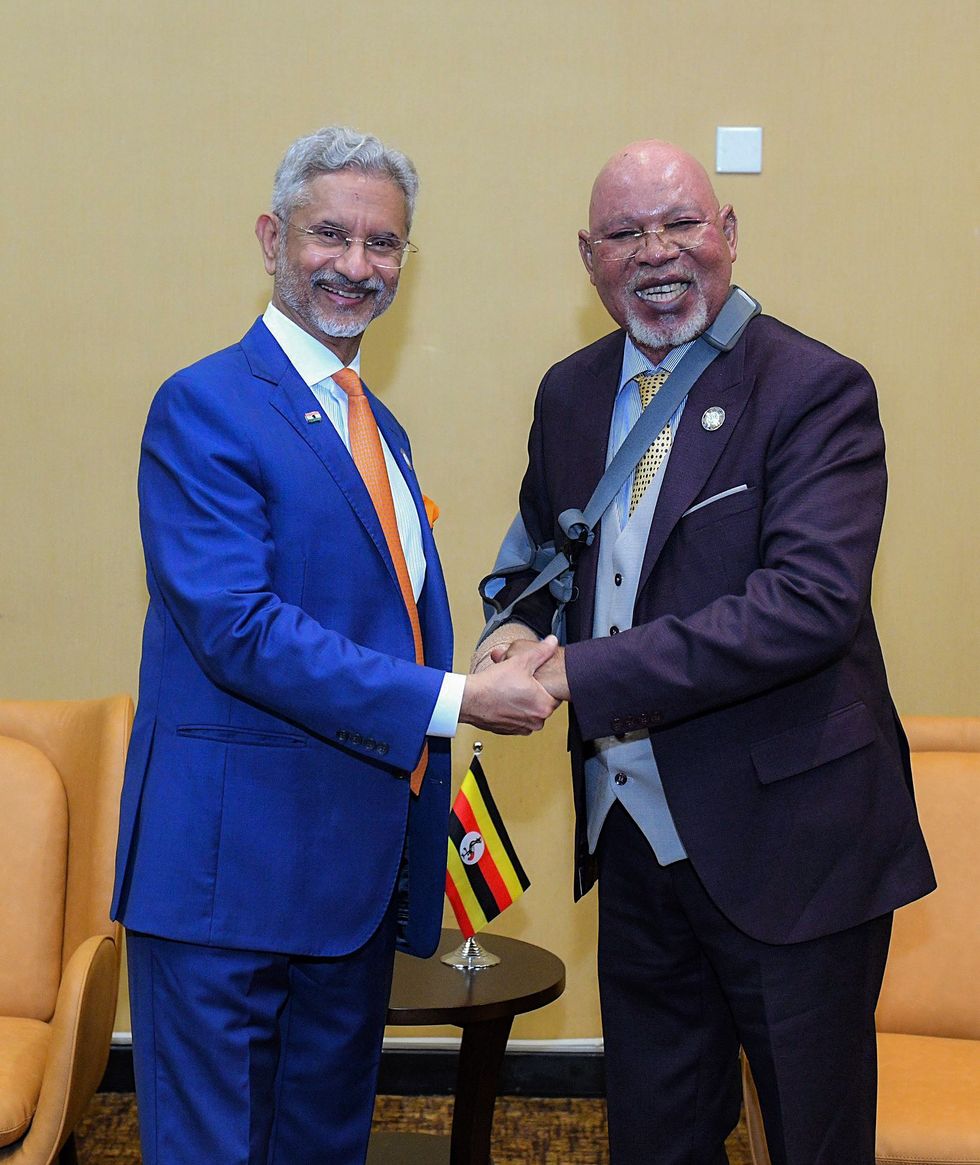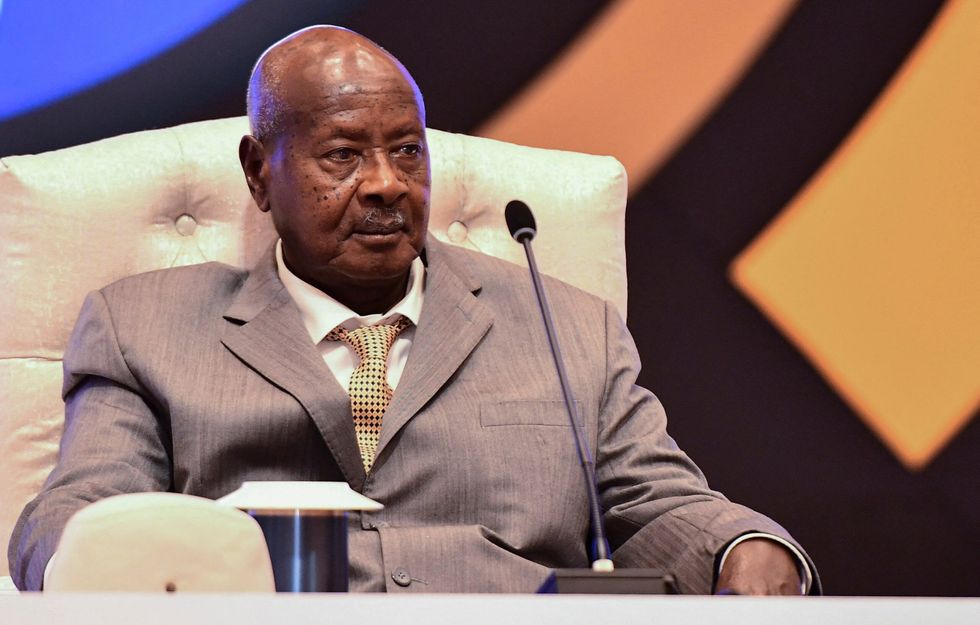UGANDA’S president, Yoweri Museveni, has appealed to British Asians expelled by Idi Amin more than half a century ago to “build a living bridge between their newfound homes in the United Kingdom and the cherished homeland of their forefathers”.
His emotional message was aimed at some 30,000 refugees – and their descendants – who have made a stunning success of their lives in Britain.
At the 19th summit of the Non-Aligned Movement (NAM) that the president chaired in Kampala, Museveni also went of out his way to acknowledge the role of India in helping to rebuild Uganda’s shattered economy.
Held under the leadership of Uganda, the summit brought together more than 120 developing countries and world leaders, including the US secretary general António Guterres.
Museveni noted India had played a leading role in the formation and development of NAM.
The president has been consistent in trying to make amends for the damage done to Uganda, and especially its economy, by Amin since he came to power in 1986.
Museveni expressed regret for the harm Amin had inflicted, saying, “NAM countries also make mistakes like in Uganda. Then we had a man called Idi Amin. In a very short time, he expelled our Asians, especially (people from) India and Pakistan. You had a leader of a NAM country undermining his own economy.”

He said pioneers from India had invested in sugar, hotels and steel production. After they were forced to leave the country, a large, prosperous community of Ugandan Asians found themselves scattered across the globe, many having abandoned businesses on which they had spent a lifetime.
Museveni’s government had taken steps to rectify the problems created by Amin. “When we came into government, we gave back the properties of our Asian citizens and non-citizens that Amin had taken from them,” he told the summit.
The vacuum left by Uganda Asians was filled in the 1980s and 1990s by businessmen from India. In fact, they had since become a pillar of the Ugandan economy. A handful of Uganda Asians had also been tempted back.
“I was asking people (in my government) how many factories have been built by our Indian returnees,” Museveni added. “They told me about the 900 factories they had built since they came back.”
India was represented at the summit last month by its foreign minister Subrahmanyam Jaishankar. He met his opposite number in the Uganda government, General Odongo Jeje, and spoke in positive terms about the growing bilateral relationship.
“Assured India’s wholehearted support for Uganda’s Chairship (of NAM)”, he said on X.
“Noted the progress in our bilateral cooperation since my April 2023 visit. Direct flights, training & exchanges, and commencement of the NFSU (National Forensic Sciences University) campus are among notable developments.”
In the 52 years since the first refugee flights landed at Stansted, many of the first-generation refugees have died.
But Museveni’s hopes that their children and grandchildren could possibly help to rebuild the economy of “the pearl of Africa” (Sir Winston Churchill’s phrase) have been reinforced by Nimisha Madhvani, whom the Ugandan president specially chose as his high commissioner in London.
She spoke at a recent event in London to wind up the affairs of the India Overseas Trust, a charity set up “to promote, protect and support the interests of the British Indian diaspora”, especially from Uganda. Tributes were paid to its founding chairman, Praful RC Patel, who died last year aged 84. He was the only Asian member of the Uganda Resettlement Board.
Madhvani said she had hurried over from Kampala, where she attended the NAM summit.
She told a gathering of prominent Uganda Asians at the London event: “Uganda is your home, your roots. And I really, really want you to think of visiting Uganda.”
She pointed that in January, Uganda had hosted “five major international summits”, which had been attended by 5,800 guests and 120 official delegations at a “state-of-the-art convention centre” built to seat 3,800 people.
“There were no negative incidents, and that really shows you how safe we are,” she stressed. “Therefore, for those of you who haven’t been (to Uganda), it’s a country of vast opportunities.”
“Otherwise, just have a holiday,” she suggested.
The high commissioner repeated Museveni’s appeal to Ugandan Asians to renew their bond with their “motherland” by reading out a message from him that had been printed in a brochure.
Museveni, who is 79 and came to power in 1986, told the London event, “Dear fellow Ugandans and my overseas bazukulu (grandchildren), greetings.
“As we conclude the global events of the Non-Aligned Movement and the group of 77 countries (G77) summits currently taking place in Kampala, I am honoured to address you in the spirit of unity and remembrance of the traumatic events of August 1972 from which our country has recovered on account of our fights for freedom, equality and opportunity as resistance fighters of Uganda.

“It is with pleasure that I acknowledge the commendable work undertaken over the past two years by the India Overseas Trust in London to record and commemorate the Uganda exodus in 1972.
“We were young people at that time and we resolved to fight Idi Amin in those days, because of these evils he unleashed on one of the most enterprising communities that had led the small Uganda economy then – the Asian community, along with thousands of indigenous Ugandans.
“The events which saw the expulsion of our Asian brothers and sisters from their motherland, Uganda, serves as a testament to the resilience and fortitude of those who faced adversity and overcame it.
“What may have been perceived as Uganda’s loss in 1972 has undeniably become Britain and somehow, the world’s gain. The indomitable spirit of the Asian community has left an enduring legacy, shaping the cultural tapestry of both Uganda and the United Kingdom.”
The president recalled a landmark visit in London: “In 1997, I had the distinct honour of addressing a gathering of these resilient brothers and sisters at the BAPS Hindu mandir at Neasden in London.
“The event, organised by the late Manubhai Muljibhai Madhvani, was a reminder of the enduring connections that bind us across continents. During that event, I invited my brothers and sisters to come back to their motherland, and we have restored to the full what was lost in the difficult days of Uganda to them, although nothing replaces the cultural, social and emotional displacement of those who went through these difficult events.
“Many of these have become a strong base on which our growing industrial and agricultural growth is fast rising.
“Now, 25 years hence, I reiterate my invitation to the bazukulu of our Asian community and call upon them to build a living bridge between their newfound homes in the United Kingdom and the cherished homeland of their forefathers in Uganda.”
Museveni concluded: “I welcome you with open arms. Come visit and invest in Uganda, your home. May this brochure preserve an essential chapter in our shared history and foster a deeper understanding and appreciation of the events that unfolded during that critical time.
“May it stand as a testament to the enduring bonds that connect us all.

















Moglai Bap and Mo Chara of Kneecap perform at Glastonbury Festival at Worthy Farm in Pilton, Somerset, Britain, June 28, 2025. REUTERS/Jaimi Joy
Police may probe anti-Israel comments at Glastonbury
BRITISH police said they were considering whether to launch an investigation after performers at Glastonbury Festival made anti-Israel comments during their shows.
"We are aware of the comments made by acts on the West Holts Stage at Glastonbury Festival this afternoon," Avon and Somerset Police, in western England, said on X late on Saturday (28).
Irish hip-hop group Kneecap and punk duo Bob Vylan made anti-Israeli chants in separate shows on the West Holts stage on Saturday. One of the members of Bob Vylan chanted "Death, death, to the IDF" in a reference to the Israel Defense Forces.
"Video evidence will be assessed by officers to determine whether any offences may have been committed that would require a criminal investigation," the police statement said.
The Israeli Embassy in Britain said it was "deeply disturbed by the inflammatory and hateful rhetoric expressed on stage at the Glastonbury Festival".
Prime minister Keir Starmer said earlier this month it was "not appropriate" for Kneecap to appear at Glastonbury.
The band's frontman Liam Óg Ó hAnnaidh was charged with a terrorism offence last month for allegedly displaying a flag in support of Iran-backed militant group Hezbollah at a concert in November. He has denied the charge.
A British government minister said it was appalling that the anti-Israel chants had been made at Glastonbury, and that the festival's organisers and the BBC broadcaster - which is showing the event - had questions to answer.
Health secretary Wes Streeting said he was also appalled by violence committed by Israeli settlers in the occupied West Bank.
"I'd also say to the Israeli Embassy, get your own house in order in terms of the conduct of your own citizens and the settlers in the West Bank," Streeting told Sky News.
"I wish they'd take the violence of their own citizens towards Palestinians more seriously," he said.
(Reuters)